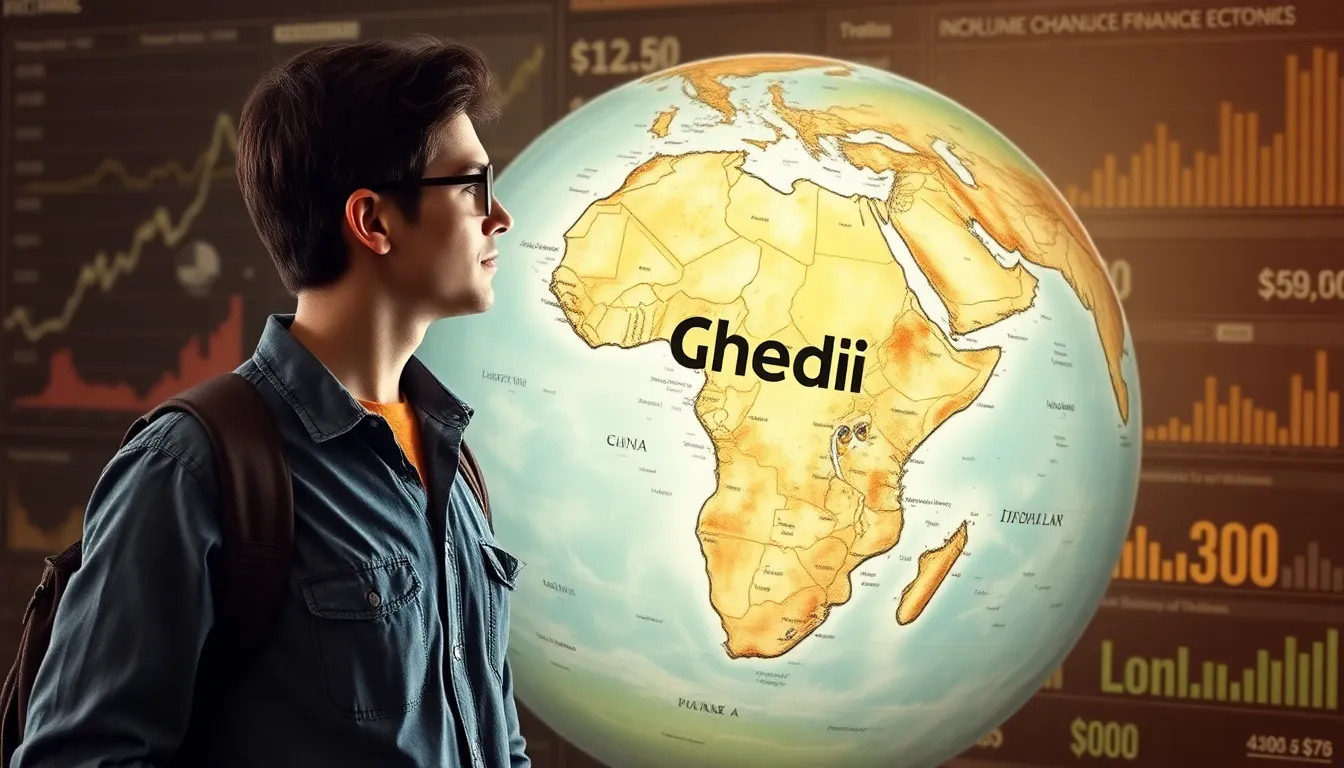In a world where currency exchange rates can feel as unpredictable as a cat on a hot tin roof, understanding how much a dollar is worth in Ghana cedis can save you from some serious financial faux pas. Whether you’re planning a trip to the vibrant markets of Accra or just curious about the latest exchange rate, knowing the value of your greenback is essential.
Table of Contents
ToggleCurrent Exchange Rate Overview
The exchange rate between the US dollar and the Ghana cedi fluctuates based on market conditions. As of October 2023, 1 US dollar equals approximately 12.15 Ghana cedis. Currency values change frequently, making it crucial for travelers to check exchange rates before making financial decisions.
Monitoring the exchange rate allows travelers in Ghana to budget effectively. They can find better rates at local banks or authorized exchange bureaus, rather than relying on hotels or airports. Understanding the market can help individuals avoid paying higher fees.
Daily fluctuations occur due to various factors including inflation, economic indicators, and geopolitical stability. In recent months, the cedi has shown signs of depreciation against the dollar, impacting purchasing power in Ghana. Investors must remain aware of these shifts to anticipate their financial outcomes in international transactions.
Comparing historical data reveals that the cedi has been more volatile over the past five years. Significant highs and lows occurred that reflect Ghana’s economic developments. Users can utilize various online currency converters for real-time exchange rates.
Travelers planning to purchase goods in Accra’s markets should consider the local currency’s value. Understanding how much 1 dollar translates into cedis helps with price negotiations. Ultimately, being informed about current exchange rates fosters financial confidence and effective spending.
Factors Influencing Exchange Rates

Exchange rates fluctuate due to multiple factors that directly impact economic stability. Understanding these influences helps travelers make informed decisions.
Economic Indicators
Economic indicators significantly affect the exchange rate between the US dollar and the Ghana cedi. Inflation rates offer insights into the purchasing power of the cedi. Higher inflation often leads to a weaker currency, influencing exchange rate values. Additionally, GDP growth rates provide context on economic performance. A growing GDP typically strengthens a currency, making the cedi more valuable against the dollar. Employment rates also play a crucial role, as higher employment often boosts consumer confidence and spending. Keeping track of these indicators allows travelers to gauge the potential direction of exchange rates effectively.
Political Stability
Political stability is a critical determinant of exchange rates. When a country experiences political turmoil, the uncertainty can lead to a depreciation of its currency. Investors tend to withdraw funds from unstable environments, weakening the cedi further against the dollar. Conversely, stable political conditions encourage foreign investment, bolstering the currency’s strength. The government’s ability to implement effective policies can also influence perceptions of stability and economic health. Travelers should monitor political climate developments to understand their potential impact on exchange rates, ensuring they spend wisely during their visit.
Historical Trends of Dollar to Ghana Cedis
In the past five years, the exchange rate between the US dollar and Ghana cedis experienced significant fluctuations. Records indicate a marked depreciation of the cedi against the dollar, particularly during times of economic instability. Notably, exchange rates in 2018 showed the cedi at approximately 4.5 per dollar, illustrating a drastic increase to around 12.15 by October 2023.
Analyzing quarterly data reveals that higher inflation rates in Ghana often corresponded with a weakening cedi. In the third quarter of 2022, the inflation rate hit 31.2%. This peak significantly influenced the exchange rate, resulting in greater volatility. Economic conditions, including GDP growth and employment statistics, also played essential roles in shaping the currency’s value.
Foreign investments reflect fluctuating confidence in the cedi as well. Stable political environments tend to boost investor sentiment, while political unrest results in rapid depreciation. For instance, in early 2020, political uncertainties led to a sharp decline in cedi value, prompting concerns among traders and travelers alike.
Daily shifts in the exchange rate highlight the ongoing need for travelers to remain vigilant. Monitoring changes can help ensure they secure favorable rates and make well-informed decisions. Grasping the trends provides them not only with insight into market behaviors but also equips them to negotiate prices effectively during their visits to local markets in Ghana.
Recognizing these historical trends fosters a greater understanding of the current economic context, further empowering users to navigate the dynamics of currency exchange effectively.
Impact of Exchange Rate on Trade
Exchange rates directly influence the trade dynamics between the US and Ghana. As the exchange rate shifts, the cost of exported and imported goods also changes. When the US dollar strengthens against the Ghana cedi, Ghanaian exports become more expensive for American buyers. This situation can lead to decreased demand for Ghanaian products in the US market.
Conversely, a weaker cedi makes American goods cheaper for Ghanaian consumers. This scenario encourages increased imports, which can have a significant effect on the local economy. As individuals opt for cheaper American products, the balance of trade may shift unfavorably for Ghana.
Factors affecting trade due to exchange rate changes also include the volatility of the cedi. Increased volatility enables unpredictable costs for importers and exporters. Importers may face higher prices unexpectedly, while exporters could benefit from sudden favorable rates.
Historical trends illustrate these effects. Since 2018, the cedi has depreciated from approximately 4.5 to about 12.15 per dollar, raising concerns for traders regarding pricing strategies and profit margins. With inflation peaking at 31.2% in Q3 2022, trading businesses have experienced heightened operational challenges.
Political stability plays a crucial role as well. Countries with stable political climates tend to attract foreign investment, delivering benefits to both parties involved in trade. However, instability often prompts swift changes in currency value, directly impacting trade decisions.
Understanding these dynamics assists traders and travelers alike in navigating Ghana’s market challenges effectively. Being aware of exchange rate implications leads to more informed trade decisions and budgeting strategies, ensuring favorable outcomes.
Conversion Methods
Conversion methods play a crucial role in obtaining the best exchange rates for US dollars to Ghana cedis. Understanding these methods helps travelers and traders make informed financial decisions.
Currency Exchange Services
Currency exchange services offer various options for converting US dollars to Ghana cedis. Local banks typically provide competitive rates, aiding customers in getting favorable deals. Authorized exchange bureaus also exist, often located in popular tourist areas. These bureaus exchange currency without hidden fees, benefiting travelers looking for cash in hand. Airports and hotels generally offer less attractive rates, so using local services is advantageous. Travelers should verify the rates before proceeding with a transaction. Comparing rates among different providers helps maximize the amount of cedis received for each dollar.
Online Tools and Apps
Online tools and apps simplify the currency conversion process for users. Many platforms display real-time exchange rates, allowing travelers to stay updated. Currency converter apps provide fast calculations, making it easy to determine how many cedis one dollar purchases. Additionally, websites like XE and OANDA offer reliable data on exchange rates, enhancing informed decision-making. Some apps even feature currency alerts that notify users of favorable rate changes. Utilizing these resources empowers travelers to find better rates and budget effectively during their visit to Ghana.
Understanding the exchange rate between the US dollar and Ghana cedis is vital for anyone planning a trip to Ghana. By staying informed about current rates and market trends, travelers can optimize their budgets and make smarter financial choices.
Monitoring economic indicators and political stability can provide insights into potential fluctuations in the cedi’s value. Utilizing local banks and authorized exchange bureaus can also ensure travelers get the best rates.
With this knowledge in hand, visitors can enjoy their experience in Ghana’s vibrant markets with confidence, knowing they’re making informed decisions that enhance their travel experience.



